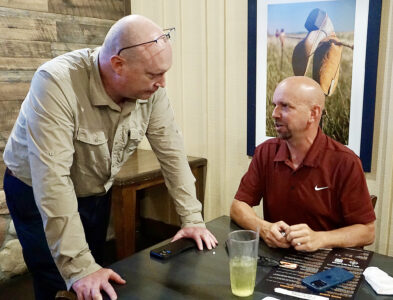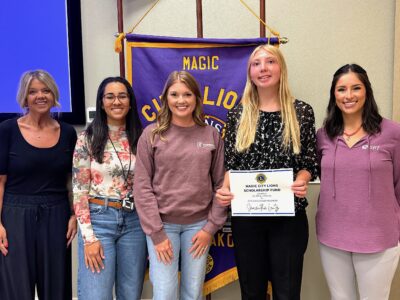‘Ukraine will win’
Three Minot women tell about their families in Ukraine

Shalom Baer Gee/MDN From the left: Diana Larson, Olga O’Brien, and Natalia Nelson are all from Ukraine. They have family in the country who are attempting to cope with the war there.
Two weeks into Russia’s invasion of Ukraine, three Minot women watch from a distance as their families face a war in their home country.
Olga O’Brien was born in Lithuania in 1962. Her father had been stationed there in the military when all men in the Soviet Union were required to serve. He stayed in Lithuania to attend college, and O’Brien worked there as a nurse until she was 30 and moved to Kharkiv, where she lived until 2002 when she moved to the U.S.
Even though she spent three decades in Lithuania, she still feels the most connected to Ukraine. Her mother grew up in Khitomir, and her father grew up near Polvala, which is 90 miles from Kharkiv. She recalled fondly the summers she spent with her paternal grandmother in the countryside near Polvala and visiting her cousins.
“It was like freedom. We rode the bikes, ran around. We had the garden. My grandma had all kind(s) of animals. I loved it. And plus, my parents were working and my grandma took care of me and my brother in summertime when we didn’t have school,” she said.
Now a nurse practitioner in Minot, O’Brien said she worked as a nurse in Vilnius, the capitol city of Lithuania, during the attacks on the city by the Soviets in 1991. Lithuania had declared its independence from the Soviet Union in March 1990. In January 1991, there were a series of attacks on Vilnius by the Soviet Union in an attempt to reabsorb Lithuania.

Submitted Photo This is the apartment building where Olga O’Brien’s brother was living in Kharkiv with friends. He is currently on his way to Poland.
O’Brien recalled the railroad workers union hospital, where she worked night shift, shaking from Soviet attacks on the city.
“I remember this feeling like it’s a first time in my life experience. All building is shaking. All windows are shaking. You don’t know where to stand and what’s going to happen,” she said.
Over 30 years later, Ukraine is facing a more extreme threat. The Lithuania attacks of January 1991 lasted several days, but O’Brien said that the bombing would stop during the day.
She still has cousins in Ukraine that she’s lost touch with, but her brother was living in Kharkiv until he left recently for Poland. She said he’s disabled and has a mental illness, so he lived with a couple of friends in an apartment in Kharkiv.
The city has been the subject of repeated air raids, one of which severely damaged the apartment building her brother was living in. O’Brien said contact has been sparce during her brother’s journey, and it’s been difficult for him to receive the medication that he needs.
“I don’t know where they’re at, or how far, or anything,” she said. “They were driving cars bumper to bumper to the Polish border. Three days ago, they called me once and said for first time in seven days, we get (a) warm meal.”
While O’Brien’s brother is traveling to leave the country, Diana Larson’s family has decided to stay in Sumy, which is located south of Kharkiv on the Russian-Ukraine border and where Larson is from.
The past two weeks have been difficult for Larson. During her interview, she looked burdened. She said she had been crying from watching the news of a maternity hospital in Mariupol, Ukraine, having been bombed. Larson said that right outside the doors of the Barnes and Noble Starbucks in Minot, where The Minot Daily News interviewed her, people can be seen living, “a normal life,” which makes the situation in Ukraine all the more difficult to process.
“It’s from (a) different reality. It’s like a nightmare,” she said of what’s happening in her home country.
Larson currently lives in Minot and moved to the U.S. 10 years ago. Her family includes cousins in Sumy, Ukraine, who she described as being like her sisters and an aunt and uncle, although she mentioned she has other relatives in the country.
One of her cousins has an 18-year-old son and a husband who are within the age range of men who are required to stay in the country to fight if called upon: 18 to 60. Her aunt is elderly and sick, so her cousin doesn’t want to leave her behind.
“What do you think? What should you decide? To stay with your family. She can’t get out because it’s her family there,” said Larson, who added that Russian soldiers will shoot at cars as they try to leave and haven’t honored agreements to allow refugees to pass safely.
The Associated Press reported that refugees saw Russians shoot Ukrainians as they tried to leave the country through humanitarian corridors.
“They’ve broken the agreement and start shooting again . . . It’s a plan to torture and kill them and push people down and make them scared,” Larson said.
Larson is working three different jobs so she can send money through Western Union to her family members who are living in a bomb shelter in Sumy. She said they’re able to leave the shelter periodically to retrieve items from their homes, but the bombing is so frequent that it’s safer to not be at home. Along with the worry for her family ties, Larson is also grieving the death of her mother.
“Two months ago, my mom died, and now Putin try to take my country away,” Larson said.
For Natalia Nelson, her family in Ukraine has had to separate to get to safety. Her mother, father, stepfather, sister, and niece were all living in Kharkiv where Nelson was born in 1962.
Her mother, sister, and 4-year-old niece left Kharkiv and traveled to Lviv on a train to flee bombing in the city. Her father and stepfather, who are 80 and 91, were unable to make the journey and stayed in Kharkiv.
Nelson said her family reported that the train station was so packed in Kharkiv that conductors weren’t allowing people to bring luggage.
“They said, for your luggage, we can put one more person,” Nelson said.
The 400-mile train ride took 20 hours because it would stop anytime there was bombing. She said the train was so packed that it made it difficult for people to navigate restrooms.
“My niece, she’s four years old, she was in wet pants in cold weather because they had nothing to change (her). They left everything,” she said.
The group made it to Lviv and are staying with friends for the time being. She said Poland is overwhelmed, and her 81-year-old mother may not be able to make the journey. The Wall Street Journal reported that 1.4 million refugees have entered Poland.
Nelson said her family ultimately “wants to go home” to Kharkiv. Nelson lived in the city for 37 years and worked as a piano teacher before she moved to the U.S. in 2004 after marrying her husband. She said it’s scary and heartbreaking to watch the old houses and buildings of the city be bombed.
“They don’t care about save(ing) some histories,” she said. “They want to destroy all memories. They want to destroy everything, and of course this is sad and kind of sickness to do this.”
Despite the difficulty of watching a war unfold in their homeland, the women are holding out hope. O’Brien said that Ukraine is “a little superman.”
“Ukraine will win,” Larson said. “They’re not afraid (to) die. They fight. They’re fighters.”
- Shalom Baer Gee/MDN From the left: Diana Larson, Olga O’Brien, and Natalia Nelson are all from Ukraine. They have family in the country who are attempting to cope with the war there.
- Submitted Photo This is the apartment building where Olga O’Brien’s brother was living in Kharkiv with friends. He is currently on his way to Poland.





